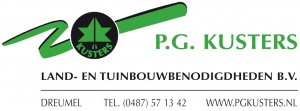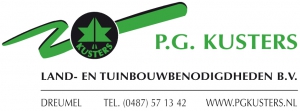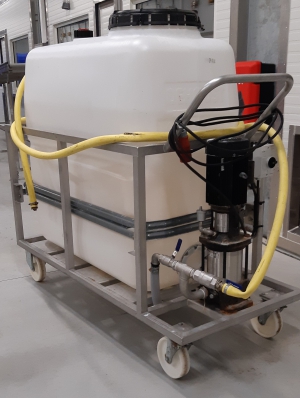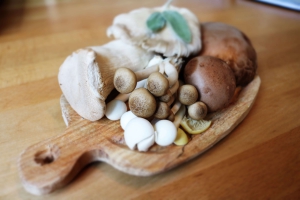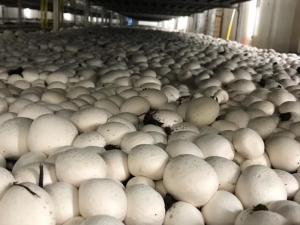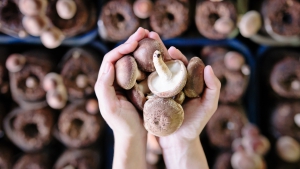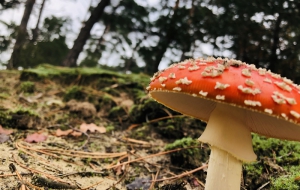
Mushroom Matter
Welcome on our platform. Why MUSHROOM MATTER? Because mushrooms play an important role in our lives as well in business. Our goal is to bring the world the very latest mushroom news with the upmost care to support the positioning of our beloved Mushroom.
Family business P.G. Kusters B.V. agricultural and horticultural supplies has been active as a supplier in the agricultural sector since 1968. This Dutch company is located in Dreumel, in the Land van Maas en Waal.
With a range of more than 5,000 products in a storage area of 3000 m², we offer business supplies for mushroom cultivation, fruit cultivation, livestock farming, arable farming and the green sector. We distinguish ourselves in the field of knowledge and service. Our experienced advisors are happy to help you to come to suitable advice together.
Your order will be carried out quickly and correctly in-house.
Especially for mushroom cultivation
All your business supplies are immediately available, thanks to our extensive stock. Think of work clothes, cleaning and disinfectants, filter materials and disposables.
As a TenCate dealer, we supply Nicolon cultivation mats, which we manufacture and repair in our own workshop, according to customer specifications. We are also a supplier of Nemycel nematodes from e-nema, for combating mushroom mosquitoes.
If you are looking for a specific product, we are happy to think along with you.
We are happy to support you by establishing a fixed delivery schedule for you.
Order your growing supplies directly here, or contact us if you want to know more about our services.
Family business P.G. Kusters B.V. agricultural and horticultural supplies has been active as a supplier in the agricultural sector since 1968. This Dutch company is located in Dreumel, in the Land van Maas en Waal. With a range of more than 5,000 products in a storage area of 3000 m², they offer business supplies for mushroom cultivation, fruit cultivation, livestock farming, arable farming and the green sector.
For mushroom cultivation they deliver all kinds of products, for exampe work clothes, cleaning & disinfectants, filter materials and disposables. Next to this they are a dealer of TenCate and supply the Nicolon nets as well as the Nemycel nematodes from e-nema.
Please read the full article here.
With nemycel® you sucessfilly and organically control the larveae of Sciarid flies. nemycel® will stop your worring about annoying flies during harvest or fungal diseases transmitted by adult flies.
I am writing this blog on November 2. 2020.
It is the warmest November day ever. The outside temperature today will hit 20° C. Normally this time of the year in Europe growing is fairly easy. Older growers always say: just open the doors and let the outside climate do the job. This year and probably oncoming years the situation is different. It starts with arable crops being harvested later than normal. The potatoes are still being harvested and the corn is only gone this week. Meaning that there was a lot of dust and organic material flying around. Especially since many farms are situated in rural areas. All this organic matter being airborne has caused a big problem with Mycogone and verticillium. But another and maybe even bigger problem is that the insects are still there. It is known that phorids stop flying around 5° C and sciarids even fly till it starts freezing. And that situation seems to be far away. And that is why I see at many farms that the infection with sciarids was almost gone but is returning (rapidly) again. Because their hiding place in the corn is gone. Just at the moment when many farms are scaling down on fly control. The combination of these two factors, the insects and the dust causing bubble, is a dangerous one which may last for another month or so. What to do about it? Trying to kill the verticillium or Mycogone is the first thing growers do but if the vector (insects) to carry the spores is still there the problem stays. That is why I always try to aim at the insects first. In this case practically always a problem with mosquitos or sciaridae. Often chemicals are chosen and many times a combination of a short term chemical by fogging and a long term chemical as a drench on the casing soil. But lately I see very good results (as good as the chemical treatment) with the biological control with nematodes as a drench on the casing. In price there is not much difference but in application it does make a difference. It is not dangerous for the person who applies it and it is not dangerous for the environment. On the other hand it is noticed that many supermarkets want a clean, read: chemical free, product. And nematodes are not regarded to be dangerous. Even more, farms use it as advertising for their product. It is the same as with my own business “Akkie’s Tuin”. An apiary and orchard. We do not use chemicals, only biological control and we use that as a selling point. We notice that we can get higher prices for our products by working organic. The only thing is that the customer needs to know what you do. With the product goes the story about what you do. So if you have an insect problem at the moment take this into consideration. A few remarks on the use of nematodes. Make sure they are delivered fresh onto the farm and put them into the cold store right away. Overheated nematodes will die. When using them, you need sciarids on the farm. The nematodes feed on the larvae of the mosquito and if there is no food they will die. The manual about using the nematodes often says that they have to be applied directly after casing the compost. I however have better experience in the so called split application. So not the 2 million nematodes per m² directly after casing but 1 million on the casing day and the other 1 million 4 to 7 days later. I prefer 2 days before the start of the recovery period as the last day of application. So practically this means the second application on day 4 after casing. If you apply it a day before recovery you knock back the mycelium too much.
But whatever you do, do it now. If you think that frost will stay away for a while and you see some sciarids flying around, waiting is not an option. Especially is you also have a bubble problem. And the difference between sciarids and phorids is fairly big. As a reminder: Phorids have a nasty smell if you smash them under your finger, a sciarid has no smell. Phorids are fast moving. They walk fast. A sciarid has the tendency to just sit. Phorids are a lot smaller and the antennae are practically not visible while the sciarid has large visible antennae.
The story of Valon Bahtiri (32) from Hagen reads like a boy's book. From Maasdijk in Westland, this young director runs Europe's largest exotic mushroom company. He came here as a political refugee and is now director of an internationally operating organization.
Please click here for the complete article, for our dutch readers
Source: Algemeen Dagblad
Double & Triple Flush, Fructification Mushroom technology
My name is Zlatko Vidmar. I have a Master’s Degree in Biology, with specializing in Micology. I have been working the mushroom industry for over forty years, mostly as a consultant. I have worked in Bosnia, Italy, China, Vietnam, Canada, USA, Australia and Algeria. While working in China, I paid special attention to technology after covering with casing material. The method I have been using for over thirty years, I called double and triple flush.
My methodology desires that the casing soil must be sufficiently moist for the first four to five days, after casing. Amount of water varies according to which peat moss is used, black or white, whether sugar beet live or sand is used and how many per cubic meters. What is the percentage mixture of white and black peat moss? The amount of water in those first couple of days is always different and varies from twelve to thirty or more liters.
The grower must make sure that casing soil is on the anaerobic edge after four or five days. The grower must pay attention to the growth of mycelium from the casing soil. I slowly blow air out of my mouth in the direction of the mycelium and if mycelium bends and returns to the starting position, I still wait with fresh air. When the mycelium becomes tired, solid and does not return to its original position, I put fresh air to maximum and increase the air flow.
Note that all the time, after casing, the fresh air is zero and ventilation is about forty percent. When I open fresh air, I add water at the same time; one liter per sq. meter. I lower air temperature and compost as soon as possible to nineteen (air) and twenty-one (compost). The next day, at the same time, I add another liter of water per sq. meter and continue with the flush. Forty-eight hours after the temperature of the compost is about twenty-one and the air temperature about nineteen, grower is able to see small formation of mushroom (pin heads). Many grower call this method of flushing hard flush, only without water.
Now comes what I call double flush.
I completely calm the room by turning off the ventilation and fresh air, actually I simply turn off the electricity. After that, I often tour the room and watch the growth of mushroom carefully. The duration of this part of the flush depends on what the grower wants. Large amount of mushrooms of lower quality (fresh + can) or less mushrooms with high quality (100% fresh).
Also, if the grower wants to stagger more, they can keep longer time without fresh air or ventilation.
I normally leave the room quiet for a minimum of six hours and maximum of ten hours. I think the best results are eight hours at better built farms with better equipment. After six, seven, eight, nine and ten hours, I re-add one liter of water per sq. meter and turn the room back on with full fresh air and ventilation up to ninety percent. The next day, I again repeat the same process of adding another liter of water per sq. meter and continue with the same ventilation and fresh air.
The following day, I set the ventilation to medium, close the fresh air to medium (CO2 around 2000ppm) and wait for the result of the process. If I have too many mushrooms the same size, I do triple flush repeating double flush, meaning I calm the room (no electricity) for eight hours. I, then, add one liter of water per sq. meter, ventilation (fan) 100x and fresh air the same, 100x.
I repeat watering the next day at the same time and the day after, set ventilation at 50x and fresh air at 40-50x (2000ppm CO2).
All the way until harvest, I ensure my mushrooms have all the above conditions for good growth and high quality.
I hope those that are reading this article, will try my technology and if you have any questions, feel free to contact me either via LinkedIn or via email below.
E-mail: This email address is being protected from spambots. You need JavaScript enabled to view it.

In a few words we wish to describe to you what e-nema does, for whom and why.
E-nema is commited to solve one of the fundamental issues in agriculture and development: the use of chemical pesticides.
E-nema GmbH is a successful company and market leader in the production of nematodes and represents the biological alternative to chemical insect control. Therefore e-nema combines cutting-edge technology and biological crop protection, always with the aim of making the world a better place.
In 1997 e-nema was founded in Schwentinental Germany by the three partners Prof. Dr. Ralf-Udo Ehlers, Dr. Arne Peters and Tillmann Frank to make a contribution to the compatibility of plant protection and nature conservation. With the product nemycel®, e-nema offers the biological alternative for controlling Sciarid in mushrooms. nemycel® contains the insect pathogenic nematode Steinernema feltiae. Nematodes are roundworms that are natural enemies of Sciarid fly larvae.
Nemycel is as easily applied as any chemical pesticide, but it is much more effective and environmentally friendly!
An international team works in the company's laboratories, on continually improving processes and products as well as developing new ideas and solutions for plant protection, aquaculture and in biocatalysis, the 'white' biotechnology. For further information or to contact e-nema, please visit their website. please visit their website.
A wet start to October has brought mushrooms up all over the place. Other fungi have appeared with them. One has just killed one of my 30-year-old ornamental pear trees.
Please read the full article here.
Source: Financial Times Ltd, October 16 2020














